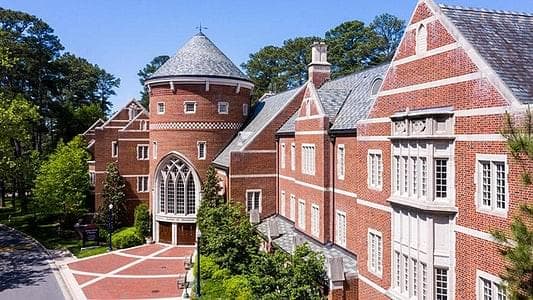

University of Richmond Admissions 2026-27
Richmond, Virginia, United States
- Cost of Living$ 17,220
- Tuition Fee From$ 14,750
- Country Rank#268
- Batch Strength3,291
- Global Diversity11%
- Gender Ratio47:53
University of Richmond Entry Requirements
Admission to the University is more competitive, with the University of Richmond's acceptance rate at 31% and a 34.2% early acceptance rate. SAT scores between 1280 and 1460 or an ACT between 30 and 33 are required for admission to the University of Richmond for half of the candidates. However, 25% of accepted applicants obtained scores above these thresholds, while 25% received scores below these thresholds. The University of Richmond has a January 1 application deadline and a $50 application fee.
Minimum Admission Requirements
The minimal University of Richmond entry requirements for entrance are a high school diploma (or a comparable credential) and the successful completion of 16 units of secondary school study. Four units in English, three in college-level mathematics (including Algebra I, II, and Geometry), and at least two each in history, laboratory science, and a second language are the minimum prerequisites (two units of the same language, including American Sign Language). Candidates who weren't able to fulfil these basic requirements are still welcome to apply for admission, but the uni advises them to include a written justification for why they weren't able to do so with their application.
The University of Richmond Fees
39% of full-time undergraduate students at the University of Richmond get some form of need-based financial aid, with the typical need-based scholarship or grant award coming in at $47,735.
Paying for a college education doesn't have to be difficult or devastating. Visit the Paying for College resource centre to learn how to cut costs and save money. The U.S. News 529 Finder can help you locate the ideal tax-advantaged education investment account. To understand the University of Richmond fees a little better, see the structure below:
- Arts & Science/Business/Jepson, all students 3.5-6.0 units: $30,165 per semester
- Law School, 9-17 credit hours: $25,755 per semester
- MBA, new students (per hour): $1,530 per semester
- MBA, returning students (per hour) admitted prior to summer 2022: $1,500 per semester
- SPCS - undergraduate: $550 per semester
- SPCS - graduate: $690 per semester
Placement
The university gives students lots of chances to network and engage with alumni and companies for career development, therefore the University of Richmond placement office is always available for student aid. Students are given firsthand exposure to various businesses, associations, and career options, whether at receptions, on field trips, or through shadowing. The median Salary of an Alumni is $56,600. 24% of Spiders (as Richmond likes to call its students) enrol in graduate school within a year of graduation. And 94% of those looking for work have found employment. Here’s how you can land yourself a job or internship with the help of the university.
Meet the Career Advisor
The career counsellors can work with you one-on-one to help you realise your career objectives, regardless of where you are in the process of looking for a job, experiential opportunity, internship or volunteer opportunity.
Resume Review
Put your best foot forward by having the career counselling staff give your CV a professional assessment.
See Who Is Currently Hiring
Use Handshake to look for employers hiring on campus and to apply for internships and employment.
Search For Micro-Internships
Micro-internships are temporary, paid tasks that can be done online and lead to full-time employment. Students can access these possibilities with the aid of Parker Dewey.
Interview For Jobs
Even your interviews for internships and jobs won't require you to leave campus. For the sole purpose of hiring Spiders, hundreds of representatives from various organisations go to Richmond. With mock interviews and lectures on best practices, the university can assist you in getting ready.
“Spider-Shadowing”
Spending time with alumni and employers at their workplaces allows students to consider their career alternatives and learn more about other professions.